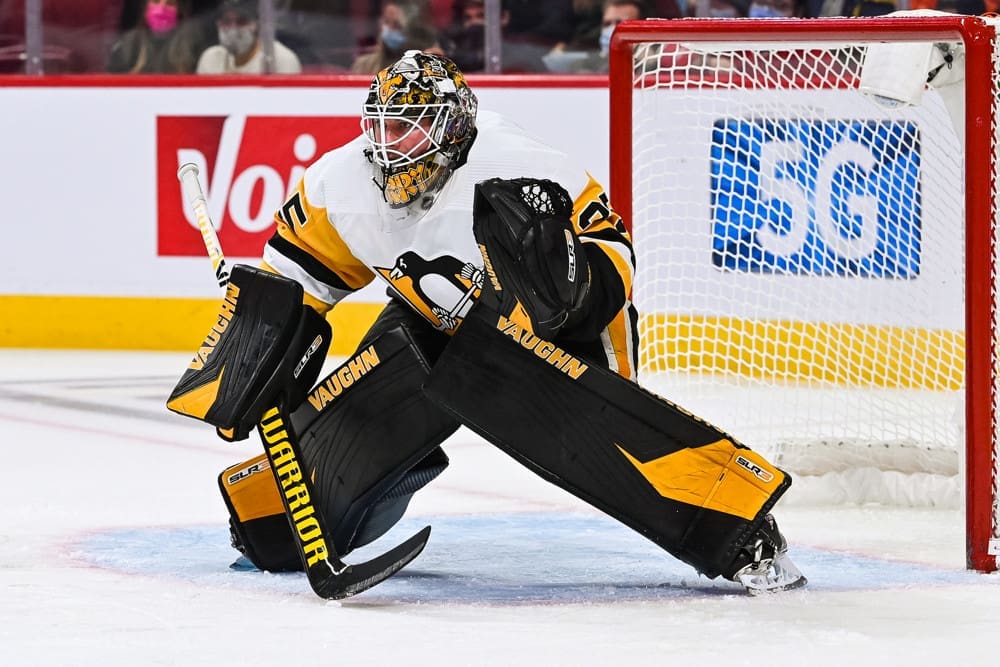Penguins
Molinari: Dubas Places High-Stakes Bet on Jarry

Kyle Dubas had some simple advice for the Pittsburgh Penguins’ scouts at the NHL Draft in Nashville last week.
Take some swings, he told them. Don’t be afraid to gamble on a player who has a chance to be a difference-maker.
His point was, sometimes it’s necessary to take a risk to get a big reward.
A few days later, Dubas, the Penguins’ president of hockey operations and interim GM, acted on his own counsel by placing a $26.875 million wager on Tristan Jarry.
And there’s much more at stake than just the $5.375 million salary-cap hit Jarry will carry for the next five seasons.
Whatever chance the Penguins have of winning another Stanley Cup in the next few years — assuming they have even a remote possibility of accomplishing that — hinges on Jarry playing to the absolute peak of his ability.
Which he has done.
Occasionally.
When he is healthy.
Which he hasn’t been for extended stretches during the past few seasons.
There are quite a few reasons Dubas could have — arguably, should have — walked away from Jarry. His injury history, for starters. Then there is Jarry’s 2-6 record in eight career playoff appearances, to go with a .891 postseason save percentage.
Numbers like those don’t inspire parade-planners to start mapping out a route.
Conversely, there are entries in Jarry’s resume that support retaining him as the Pittsburgh Penguins’ go-to goaltender.
While being chosen to play in an all-star game hardly establishes a player’s credentials as an elite talent, it can’t be ignored that Jarry was selected twice in three years. And any question about his intangibles should have been answered when he insisted on playing Game 7 in the Penguins’ opening-round series against the New York Rangers in 2022, even though he still was recovering from a broken foot.
The Penguins lost that game in overtime, but Jarry earned a lot of respect — in and out of the locker room — for his grit and commitment to the group.
Oh, and there was one other reason for Dubas to re-sign Jarry, and put the franchise’s short-term future largely in his hands: He didn’t have much choice.
Had Jarry been allowed to walk, Dubas wasn’t going to find a Stanley Cup-caliber goaltender in free agency — Joonas Korpisalo and Frederik Andersen were the standouts in a decidedly lackluster class — and the chances of acquiring one in a trade fell somewhere between miniscule and microscopic.
Keeping Jarry obviously doesn’t come with any guarantees, but there also was no assurance that Dubas could have found an upgrade, let alone that one could have been acquired at anything approximating a reasonable price.
Hey, how much leverage would Dubas have had in negotiations with another team when it would have been clear that he was desperate to add a No. 1 goalie while the window for contending for a Cup with the Crosby-Malkin-Letang core is, at very best, barely cracked open?
Of course, even if Jarry is able to stay healthy and elevate his game to its absolute pinnacle — and keep it there — the Penguins’ next few seasons could end in the same kind of disappointments as every one has since their Cup run in 2017.
There are lots of good teams out there. Teams that are younger. Faster. More skilled. Better balanced.
There’s no predicting when serious injuries to key personnel will happen. And even the most accomplished and reliable players sometimes have a season in which they don’t perform to expectations.
But at least one thing is certain: If a team doesn’t have quality goaltending, especially in the playoffs, it doesn’t matter what the 18 forwards and defensemen do.
So sure, the odds on the Pittsburgh Penguins claiming a sixth Cup are, to be charitable, long.
Nonetheless, holding onto Jarry might have been the best bet Dubas could make. Perhaps even the only one.












